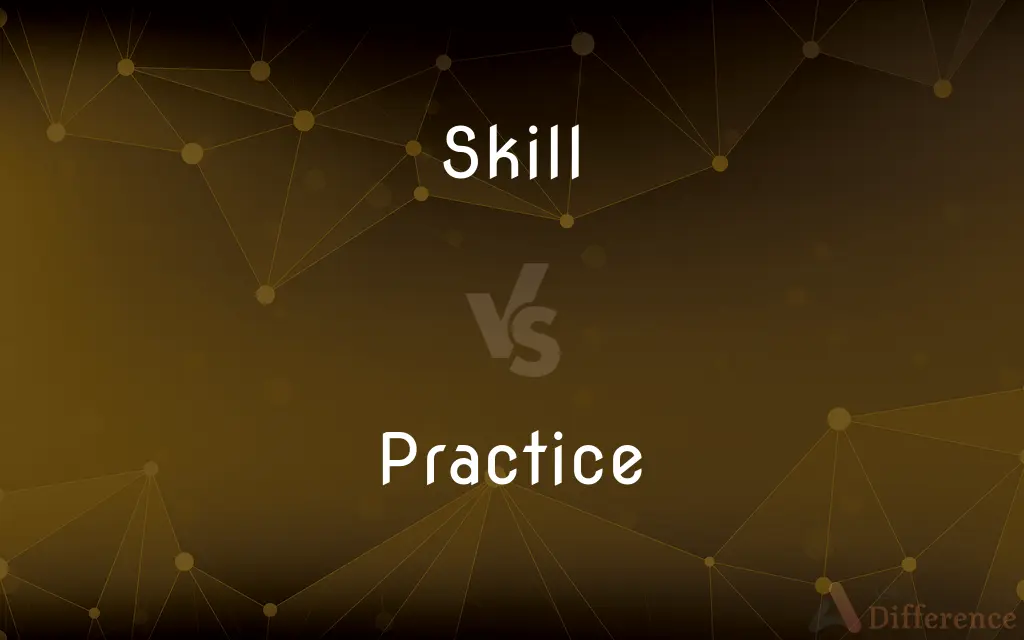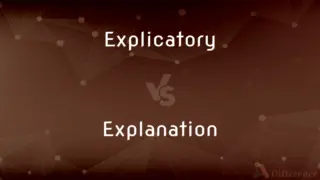Skill vs. Practice — What's the Difference?
By Tayyaba Rehman — Updated on October 27, 2023
Skill is the ability to do something well, often due to training or experience, while Practice is the act of repeatedly performing an activity to improve proficiency.

Difference Between Skill and Practice
Table of Contents
ADVERTISEMENT
Key Differences
Skill typically refers to the proficiency, expertise, or talent one possesses in a particular area. It denotes the ability to perform a task with competence, often due to training, innate ability, or experience. Practice, on the other hand, signifies the act of doing something repeatedly, often to develop or maintain one's skill.
While skill might be inherent for some, for most, it's cultivated over time. Many achieve skill through consistent and focused practice. For instance, a musician might have a natural aptitude for music but develops skill through regular practice.
Skill is often the end product or goal that individuals strive for. It's the result of dedication, training, and often, much practice. Practice, meanwhile, is the process or journey, a method employed to achieve or hone a particular skill.
In a broader sense, skill can apply to mental abilities, such as problem-solving or critical thinking, while practice might point to the application of those abilities in various scenarios. For example, a student might have a skill for mathematics and practices by solving problems.
A crucial distinction is that skill is about ability, whereas practice is about action. One can possess a skill without practicing it, and one can also practice something without necessarily possessing high skill.
ADVERTISEMENT
Comparison Chart
Definition
Proficiency or expertise in a task.
Act of doing something repeatedly to improve.
Outcome vs. Process
End product or goal.
Journey or process.
Inherent vs. Developed
Can be natural or developed.
Always requires action and repetition.
Usage
Refers to competence or talent.
Highlights repetition and consistency.
Broad Context
Can denote mental or physical abilities.
Typically refers to the application or exercise of a skill.
Compare with Definitions
Skill
Proficiency in a particular activity.
Her skill in painting is commendable.
Practice
To do or perform something habitually or repeatedly
Why not practice in the same manner that you preach?.
Skill
A particular ability or talent.
Writing is a skill not everyone possesses.
Practice
Regular repetition of an activity.
Daily practice makes her an excellent pianist.
Skill
Expertise obtained from training or practice.
Years of study gave him a skill in linguistics.
Practice
Professional work or business.
She opened her own medical practice.
Skill
A skill is the learned ability to perform an action with determined results with good execution often within a given amount of time, energy, or both. Skills can often be divided into domain-general and domain-specific skills.
Practice
The actual application or use of an idea, belief, or method, as opposed to theories relating to it
The principles and practice of teaching
The recommendations proved too expensive to put into practice
Skill
Proficiency, facility, or dexterity that is acquired or developed through training or experience
Painted with great skill.
Practice
The customary, habitual, or expected procedure or way of doing of something
Modern child-rearing practices
Product placement is common practice in American movies
Skill
A developed talent or ability
Improved his writing skills.
Practice
Repeated exercise in or performance of an activity or skill so as to acquire or maintain proficiency in it
It must have taken a lot of practice to become so fluent
Skill
An art, trade, or technique, particularly one requiring use of the hands or body
The skill of glassmaking.
Practice
US spelling of practise
Skill
(Obsolete) A reason; a cause.
Practice
To do or perform habitually or customarily; make a habit of
Practices courtesy in social situations.
Skill
Capacity to do something well; technique, ability. Skills are usually acquired or learned, as opposed to abilities, which are often thought of as innate.
Where did you pick up that skill?
With great skill, she navigated through the tricky passage.
Doing that coaching course not only taught me useful skills on the field, but also some important life skills.
Practice
To do or perform (something) repeatedly in order to acquire or polish a skill
Practice a dance step.
Skill
(obsolete) Discrimination; judgment; propriety; reason; cause.
Practice
To give lessons or repeated instructions to; drill
Practiced the students in handwriting.
Skill
(obsolete) Knowledge; understanding.
Practice
To work at, especially as a profession
Practice law.
Skill
(obsolete) Display of art; exercise of ability; contrivance; address.
Practice
To carry out in action; observe
Practices a religion piously.
Skill
Great, excellent.
Practice
(Obsolete) To plot (something evil).
Skill
(transitive) To set apart; separate.
Practice
To do something repeatedly in order to acquire or polish a skill
With any musical instrument, you need to practice to get better.
Skill
To discern; have knowledge or understanding; to know how (to).
Practice
To work at a profession
How long has that lawyer been practicing?.
Skill
To know; to understand.
Practice
(Archaic) To intrigue or plot.
Skill
(intransitive) To have knowledge or comprehension; discern.
Practice
A habitual or customary action or way of doing something
Makes a practice of being punctual.
Skill
(intransitive) To have personal or practical knowledge; be versed or practised; be expert or dextrous.
Practice
Repeated performance of an activity in order to learn or perfect a skill
Practice will make you a good musician.
Skill
To make a difference; signify; matter.
Practice
A session of preparation or performance undertaken to acquire or polish a skill
Goes to piano practice weekly.
Scheduled a soccer practice for Saturday.
Skill
(video games) To spend acquired points in exchange for skills.
Practice
(Archaic) The skill so learned or perfected.
Skill
Discrimination; judgment; propriety; reason; cause.
For great skill is, he prove that he wrought.
Practice
The condition of being skilled through repeated exercise
Out of practice.
Skill
Knowledge; understanding.
That by his fellowship he color mightBoth his estate and love from skill of any wight.
Nor want we skill or art.
Practice
The act or process of doing something; performance or action
A theory that is difficult to put into practice.
Skill
The familiar knowledge of any art or science, united with readiness and dexterity in execution or performance, or in the application of the art or science to practical purposes; power to discern and execute; ability to perceive and perform; expertness; aptitude; as, the skill of a mathematician, physician, surgeon, mechanic, etc.
Phocion, . . . by his great wisdom and skill at negotiations, diverted Alexander from the conquest of Athens.
Where patience her sweet skill imparts.
Practice
Exercise of an occupation or profession
The practice of law.
Skill
Display of art; exercise of ability; contrivance; address.
Richard . . . by a thousand princely skills, gathering so much corn as if he meant not to return.
Practice
The business of a professional person
An obstetrician with her own practice.
Skill
Any particular art.
Learned in one skill, and in another kind of learning unskillful.
Practice
A habitual or customary action or act
That company engages in questionable business practices. Facial tattooing is a standard practice among certain peoples.
Skill
To know; to understand.
To skill the arts of expressing our mind.
Practice
(Law) The procedure for trial of cases in a court of law, usually specified by rules.
Skill
To be knowing; to have understanding; to be dexterous in performance.
I can not skill of these thy ways.
Practice
The act of tricking or scheming, especially with malicious intent.
Skill
To make a difference; to signify; to matter; - used impersonally.
What skills it, if a bag of stones or goldAbout thy neck do drown thee?
It skills not talking of it.
Practice
A trick, scheme, or intrigue.
Skill
An ability that has been acquired by training
Practice
Repetition of an activity to improve a skill.
He will need lots of practice with the lines before he performs them.
Skill
Ability to produce solutions in some problem domain;
The skill of a well-trained boxer
The sweet science of pugilism
Practice
An organized event for the purpose of performing such repetition.
Being on a team is hard: you're always having to go to practice while everyone else is taking it easy.
I have choir practice every Sunday after church.
Skill
An aptitude or capability to perform.
She demonstrated her skill in negotiation.
Practice
The ongoing pursuit of a craft or profession, particularly in medicine or the fine arts.
Skill
Mastery or competence in a subject.
His culinary skill is unmatched.
Practice
(countable) A place where a professional service is provided, such as a general practice.
She ran a thriving medical practice.
Practice
The observance of religious duties that a church requires of its members.
Practice
A customary action, habit, or behaviour; a manner or routine.
It is the usual practice of employees there to wear neckties only when meeting with customers.
It is good practice to check each door and window before leaving.
Practice
Actual operation or experiment, in contrast to theory.
That may work in theory, but will it work in practice?
Practice
(legal) The form, manner, and order of conducting and carrying on suits and prosecutions through their various stages, according to the principles of law and the rules laid down by the courts.
This firm of solicitors is involved in family law practice.
Practice
Skilful or artful management; dexterity in contrivance or the use of means; stratagem; artifice.
Practice
(math) A easy and concise method of applying the rules of arithmetic to questions which occur in trade and business.
Practice
(US) practise
Practice
Frequently repeated or customary action; habitual performance; a succession of acts of a similar kind; usage; habit; custom; as, the practice of rising early; the practice of making regular entries of accounts; the practice of daily exercise.
A heart . . . exercised with covetous practices.
Practice
Customary or constant use; state of being used.
Obsolete words may be revived when they are more sounding or more significant than those in practice.
Practice
Skill or dexterity acquired by use; expertness.
Practice
Actual performance; application of knowledge; - opposed to theory.
There are two functions of the soul, - contemplation and practice.
There is a distinction, but no opposition, between theory and practice; each, to a certain extent, supposes the other; theory is dependent on practice; practice must have preceded theory.
Practice
Systematic exercise for instruction or discipline; as, the troops are called out for practice; she neglected practice in music.
Practice
Application of science to the wants of men; the exercise of any profession; professional business; as, the practice of medicine or law; a large or lucrative practice.
Practice is exercise of an art, or the application of a science in life, which application is itself an art.
Practice
Skillful or artful management; dexterity in contrivance or the use of means; art; stratagem; artifice; plot; - usually in a bad sense.
He sought to have that by practice which he could not by prayer.
Practice
A easy and concise method of applying the rules of arithmetic to questions which occur in trade and business.
Practice
The form, manner, and order of conducting and carrying on suits and prosecutions through their various stages, according to the principles of law and the rules laid down by the courts.
Practice
To do or perform frequently, customarily, or habitually; to make a practice of; as, to practice gaming.
Practice
To exercise, or follow, as a profession, trade, art, etc., as, to practice law or medicine.
Practice
To exercise one's self in, for instruction or improvement, or to acquire discipline or dexterity; as, to practice gunnery; to practice music.
Practice
To put into practice; to carry out; to act upon; to commit; to execute; to do.
As this advice ye practice or neglect.
Practice
To make use of; to employ.
In malice to this good knight's wife, I practiced Ubaldo and Ricardo to corrupt her.
Practice
To teach or accustom by practice; to train.
In church they are taught to love God; after church they are practiced to love their neighbor.
Practice
To perform certain acts frequently or customarily, either for instruction, profit, or amusement; as, to practice with the broadsword or with the rifle; to practice on the piano.
Practice
To learn by practice; to form a habit.
They shall practice how to live secure.
Practice first over yourself to reign.
Practice
To try artifices or stratagems.
He will practice against thee by poison.
Practice
To apply theoretical science or knowledge, esp. by way of experiment; to exercise or pursue an employment or profession, esp. that of medicine or of law.
[I am] little inclined to practice on others, and as little that others should practice on me.
Practice
A customary way of operation or behavior;
It is their practice to give annual raises
They changed their dietary pattern
Practice
Systematic training by multiple repetitions;
Practice makes perfect
Practice
Translating an idea into action;
A hard theory to put into practice
Differences between theory and praxis of communism
Practice
The exercise of a profession;
The practice of the law
I took over his practice when he retired
Practice
Knowledge of how something is usually done;
It is not the local practice to wear shorts to dinner
Practice
Learn by repetition;
We drilled French verbs every day
Pianists practice scales
Practice
Avail oneself to;
Apply a principle
Practice a religion
Use care when going down the stairs
Use your common sense
Practice non-violent resistance
Practice
Carry out or practice; as of jobs and professions;
Practice law
Practice
Engage in a rehearsal (of)
Practice
The customary way of doing something.
It's common practice to shake hands when meeting.
Practice
The exercise or application of a skill.
He is out of practice in speaking Spanish.
Practice
A routine or habit developed over time.
Morning meditation is her daily practice.
Common Curiosities
What is the main distinction between Skill and Practice?
Skill is about ability, whereas Practice is about repeated action to develop or maintain that ability.
Is Skill always inherent?
No, while some skills can be innate, many are developed over time through learning and practice.
Does every Practice result in Skill?
Not necessarily. One can practice without achieving high skill if not done effectively.
Is Practice always about improving a skill?
Most often, but practice can also be about maintaining a skill or following a routine or custom.
Can a skill become obsolete without practice?
Over time and without practice, certain skills can diminish or become outdated.
How do skills relate to talents?
Talents are natural aptitudes, while skills can be both natural and developed through learning and practice.
Do all professionals need both Skill and Practice?
Yes, professionals typically possess skills and engage in ongoing practice to maintain or enhance those skills.
Can Practice refer to a professional business?
Yes, like when referring to a doctor's or lawyer's professional business as their "practice."
Can you have Skill without Practice?
Yes, one can have a natural talent or skill but may lose proficiency without practice.
Are skills only physical actions?
No, skills can be mental, such as problem-solving, or physical, like playing an instrument.
Why is Practice important for skill retention?
Practice helps reinforce learned techniques, keeping the skill sharp and proficient.
Is it correct to say "practice a skill"?
Yes, it means to repeatedly exercise a skill to improve or maintain it.
Does Practice always lead to perfection?
Not always, but consistent and effective practice can lead to improvement.
Can you measure Skill?
Often, through evaluations, tests, or observing performance.
Can one be skilled at practicing?
Yes, effectively practicing or training is a skill in itself.
Share Your Discovery

Previous Comparison
Explicatory vs. Explanation
Next Comparison
Threw vs. ThrownAuthor Spotlight
Written by
Tayyaba RehmanTayyaba Rehman is a distinguished writer, currently serving as a primary contributor to askdifference.com. As a researcher in semantics and etymology, Tayyaba's passion for the complexity of languages and their distinctions has found a perfect home on the platform. Tayyaba delves into the intricacies of language, distinguishing between commonly confused words and phrases, thereby providing clarity for readers worldwide.














































